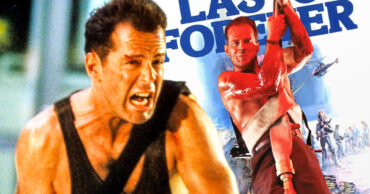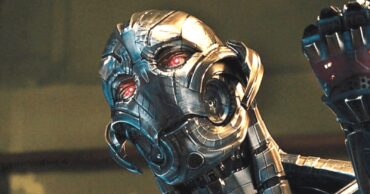Everybody loves a good rom-com. When the dreamy jock gazes lovingly into the eyes of the nerdy introvert, or when the drop-dead gorgeous woman bumps into the shy outcast and sparks fly, one can’t help but envision oneself in those scenarios. Most people seek a picture-perfect love story like Troy (Zac Efron) and Gabriella (Vanessa Hudgens) in High School Musical, or like Peter Kavinsky (Noah Centineo) and Lara Jean (Lana Condor) in To All The Boys I’ve Loved Before. While that bubble is a beautiful place to dwell in, real life doesn’t work that way.
Eventually, the haunting realization dawns on us that rom-coms are a mirage rather than a plausible aspiration. There is no Augustus Waters (Ansel Elgort) to love you unconditionally till his dying breath and nobody to serenade you like Patrick (Noah Reid) from Schitts Creek. Real-life romance is a practical discussion involving preferences and interests, a constant battle of waiting for the much-awaited follow-up text, and a frustrating spiral of unclear intentions. 21st-century romance is synonymous with lust and commitment issues, while true unconditional love seems to have taken a backseat. Let’s look at all the ways rom-coms have done us dirty as they set people up for romantic failure with utopian expectations from relationships.
Meet-Cutes Are Often Blatantly Unrealistic
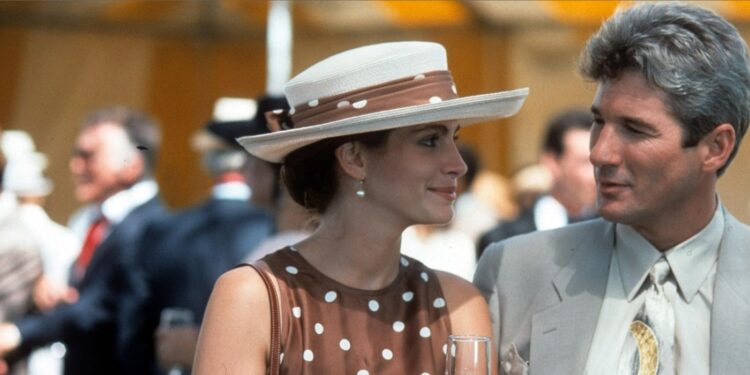
The main culprit among all romantic movie tropes is meet-cutes. One doesn’t just bump into a random stranger on the road and magically fall in love with them. It’s thrilling to fantasize about a scenario where the person sitting next to you on the plane could be the love of your life, or you conveniently bump into your celebrity crush and sparks fly instantly. Sorry to burst your bubble, but seeking a romantic connection takes a world of effort and involves constantly putting oneself out there to find someone compatible.
Rom-coms have been pushing the delusional perception that the person you are meant to be with, will miraculously discover you. But how is this so-called soulmate meant to find you if you’re sitting at home on a Saturday night watching rom-coms and eating spaghetti in bed? Edward Lewis (Richard Gere) stopping his car in front of Vivienne (Julia Roberts) in Pretty Woman, or the smooth banter between Andie (Kate Hudson) and Benjamin (Matthew McConaughey) in How To Lose a Guy in 10 Days is far too convenient and deeply unrealistic. That’s not to say there aren’t exceptions to the rule — but on a more practical level, the chances of someone having a romantic meet-cute with things working out are slight.
Rom=com Plots Justify the Overlooking of Red Flags
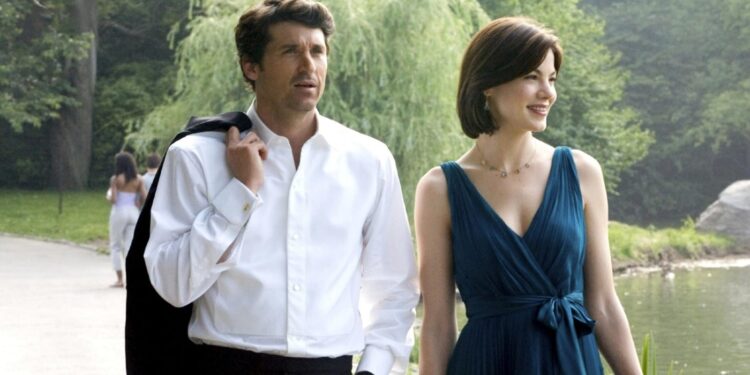
There is a prevalent pattern where rom-coms lay special focus on intangible aspects like the undeniable spark and signs from the universe, to the extent where characters’ problematic behavior often goes unnoticed. A recurring theme of blatant ignorance dwells in the plots of these movies, where crashing your best friend’s wedding at the last moment, as Tom (Patrick Dempsey) did in Made of Honor, is perfectly acceptable behavior. In a realistic scenario, one would question his irresponsible actions and demand why he chose the worst possible time to confess his feelings when he practically had years to tell Hannah (Michelle Monaghan) how he felt.
There was also that time in Something Borrowed when Dex (Colin Egglesfield) played ping pong with two childhood best friends, potentially jeopardizing their relationship with no consequences whatsoever. His red-flag behavior was incredibly frustrating. It even made the viewers wish that Rachel (Ginnifer Goodwin) had chosen Nathan (John Krasinski) over him!
Prevalent Ignorance That Love, At First Sight, Is Oddly Superficial

Love at first sight is marketed as this deep and profound emotion in movies. But when you think about it practically, it represents prevalent superficial beliefs. The whole idea of the male protagonist seeing a whole new side of his female counterpart after an elaborate makeover montage is shallow, to say the least. For instance, in Just Go With It, Danny (Adam Sandler) suddenly realizes that he’s in love with Katherine (Jennifer Aniston) now that she wears tight dresses and sports a hair blowout.
There’s almost never a scenario in rom-coms where the person one falls in love with at first sight could possibly have a terrible personality or out-of-pocket kinks. The inherent issue with most romance movies is the convenience of events and individuals. Sadly, this doesn’t hold true in the real world.
Men in Rom-Coms Don’t Exist, While Women in Rom-Coms Are Unrealistic
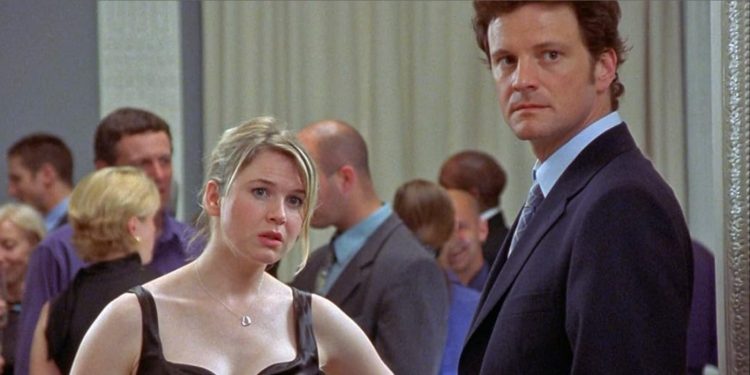
It’s time to accept that men like Mark Darcy (Colin Firth) from Bridget Jones’s Diary or Adam (Ashton Kutcher) from No Strings Attached don’t exist in real life, especially in the 21st century. In a time when women are impressed by bare minimum gestures like opening a door or receiving an instant reply to a text, Shakespeare is rolling in his grave at the state of romance in the world. Dating has inevitably turned into a strategic game of chess, with a ruthless battle to maintain the power play. Men no longer make their girlfriends personalized mixtapes or send them flowers just because they miss them.
As far as the representation of women in rom-coms go, they are swimming in a pool of problematic character writing and visualization. The women in rom-coms are often portrayed as gorgeous divas with perfect teeth and desirable bodies with a personality quirk to make them interesting. A lot of these characters need more depth, save for the fact that they are conventionally attractive and well-spoken. Although there are exceptions like Bianca (Mae Whitman) from The DUFF and Isabelle (Cara Delevingne) from Life in a Year, the overall portrayal of women sets unrealistic beauty standards in real life.
The Depiction of Coitus Is Far Too Glamorized

While sex serves as the USP to go on dates lately, one can agree that its depiction in romantic movies doesn’t even remotely resemble the real thing. Coital relations are awkward and sweaty; they are not the poetic depiction that rom-coms lead viewers to believe. Getting down and dirty on a moonlit beach like in My Fault may seem like the most beautiful experience, and the perfectly composed shower sex scene in The Lucky One could pose for steamy exploration, but more often than not, such seamless execution is hardly plausible.
Love-making in rom-coms is like floating amongst fluffy clouds with a sprinkle of pixie dust. They often miss the mark in incorporating nuanced details that could make intimate scenes appear more natural and realistic. Understandably, one would love to break a bed or two like Edward (Robert Pattinson) and Bella (Kristen Stewart) in The Twilight Saga: Breaking Dawn – Part 1 but, in actuality, you would just end up with a big fat restoration bill and a splitting backache.
There Is a Lack of Consideration for What Happens After “Happy Endings”

Ever wondered what happens after ‘The End’ rolls up in a romantic comedy? All those previously ignored red flags come back to haunt the perfect relationship. The fantasy is over and the lovebirds have bills to pay, dishes to clean, and impending fights over who will clean said dishes. Something as mundane as a towel on the floor can trigger a ballistic spat. The romantic gestures and serenades start getting overbearing, and the sex may not always be as soul-touching.
These are not to be confused with negative behavior traits. Instead, they are the raw aspects that blur the lines between reel and real life. They are ubiquitous details that make a bond more human. Humans are imperfect beings with flaws and quirks, which is precisely why the beautiful fantasy that romcoms paint in our minds must not be confused with a realistic relationship aspiration. Some layers and emotions come into play in real relationships that are absent in these movies. This is why one must treat them as an escape from reality rather than expect the same of their romantic partner or relationship. Check out why Bridgeteron fans are furious at the show’s 4th installment’s expected release date.
Watch The Twilight Saga: Breaking Dawn – Part 1 on Prime Video
 Follow Us
Follow Us




